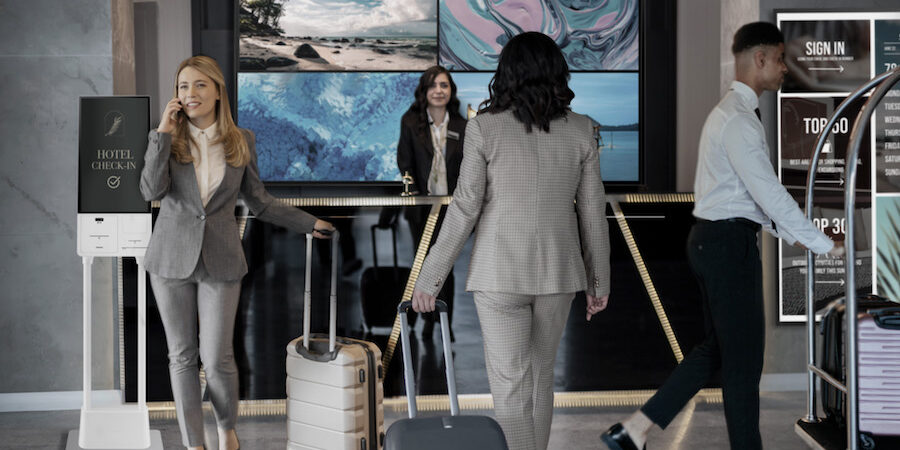In an era of unprecedented environmental consciousness, the hospitality industry is responding by embracing sustainable practices to decrease its carbon footprint. The goal is a clear one, but the means are diverse, ranging from consumer-facing initiatives like installing electric vehicle chargers and banning single-use plastic to full-scale overhauls of energy use and on-site technology.
To achieve the maximum impact, hotels need to get more guests on board with eco-friendly initiatives and actively support them. Here’s how hotel staff and guests can work together to enhance hotel sustainability efforts and create a more hospitable planet.
Top sustainability programs in hospitality
In recent years, hotels have implemented a variety of sustainability programs, some big and others quite small. Regardless of size, though, each aims to reduce a resort’s overall carbon footprint and make it a more sustainable hotel — as well as save money.
Renewable energy
One prevalent initiative is the adoption of renewable energy sources. Hotels are increasingly investing in solar panels, wind turbines and other renewable technologies to power their operations sustainably. For instance, the Courtyard by Marriott in Lancaster, Pennsylvania — the first 100% solar-powered hotel in the U.S. — stores more energy than it uses, keeping energy costs to a bare minimum. Electric vehicle chargers are fast becoming another amenity appearing in hotel parking lots and garages, including at Hilton, which is installing 20,000 Tesla chargers at 2,000 hotels.
Digital transformation and the guest experience
Learn how a single, unified digital solution can elevate and personalize your guest experience. Download Now
Water conservation
Another effort gaining momentum across the hospitality sector is water conservation. Hotels are implementing innovative solutions like low-flow fixtures, rainwater harvesting systems and guest engagement campaigns to promote responsible water usage. As part of its Room to be Green initiative, Choice Hotels promotes its linen and towel reuse program to conserve water and reduce detergent usage.
Waste management
Hotels are striving to make significant strides in waste management as part of their overall shift toward sustainability. Many properties are adopting recycling programs and composting initiatives to divert waste from landfills. Some are also proactively tackling waste on the front end by reducing or eliminating the use of single-use plastics. Hilton, for instance, transitioned from individual bath toiletries to full-size dispensers across their global portfolio and removed plastic water bottles from all managed events and meetings at its Asia-Pacific, Europe, Middle East and Africa properties. Hilton also operates one of the largest soap recycling programs in the hotel industry.
Other environmental initiatives
Other ways hotels can up the eco-friendly ante include:
- Install heating pumps, saving 50% more energy than a conventional pump.
- Compost organic waste to create fertilizer for on-site gardens and landscaping.
- Donate old, unwanted furniture to charities.
- Sell or recycle used equipment, especially electronics.
- Ban single-use plastic and use products made from sustainable materials.
- Implement LED signage and smart TVs that help conserve energy.
Incentivizing guest participation
While hotel brands are leading the charge in sustainability, engaging guests in these efforts remains crucial for maximum impact. One effective strategy is incentivizing participation through rewards and recognition. By offering perks such as loyalty points, discounts and exclusive experiences, hotels can motivate guests to embrace eco-friendly practices during their stay.
One good example is at IHG Hotels & Resorts. Its “Greener Stay” initiative rewards its loyalty guests with 500 IHG One Rewards points for every night they opt out of housekeeping services, while the Peninsula Hotel in Beverly Hills rewards electric vehicle drivers with complimentary valet parking and charging. Other rewards for eco-friendly choices, such as not replacing towels or sheets, are also possible and could include small gifts on the nightstand or small discounts.
Educational initiatives can also play a vital role in encouraging guest participation. Hotels can provide informative materials in rooms or host workshops and guided tours to raise awareness about their sustainability programs. Marriott Bonvoy’s Good Travel program offers guests the opportunity to participate in curated experiences focused on environmental protection and conservation, like beach cleaning and tree planting.
Sustainable brand loyalty
Another benefit of improving and implementing sustainability practices — and encouraging guests to do the same — is increased brand loyalty, which pays dividends for years. That’s because sustainability is a key concern for younger generations, who, more than ever, incorporate their environmental convictions into their travel choices. By actively pairing hotels and sustainability and promoting your environmental programs, you may win yourself an entire new generation of customers.
Learn how a single, unified digital solution can elevate and personalize your guest experience in this free guide. And discover more Samsung hospitality TVs, which are ENERGY STAR certified and designed to deliver a guest room experience with an at-home feel.








